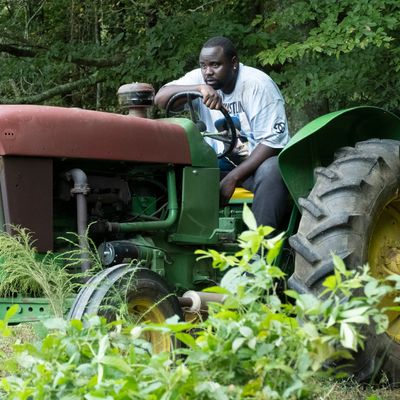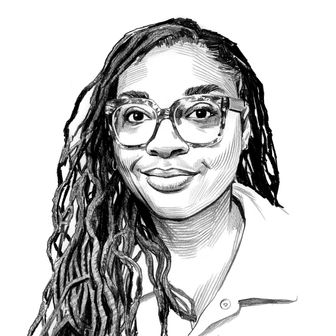
The description for this week’s episode reads, “They always making Paper Boi go through something.” And it’s so true. Last season, he suffered through a particularly bad drug trip, and just a few episodes ago, he survived a mall shooting. Now, tucked away in his “safe farm,” Al is living in the solitude of the wilderness — it’s unclear exactly where he’s located, but I’m assuming it’s a rural part of Georgia. There’s something very self-reflective about the woods; perhaps it’s the separation from other people or the out-of-body sensation that comes with feeling connected to the earth.
There’s a stereotype that Black people don’t generally enjoy being in nature, and granted, you won’t see me sleeping in a tent any time soon, but a large part of my spirituality, and the spirituality of my ancestors, is spending time with the earth in its natural state. Atlanta subverted the idea that Black people don’t enjoy being in the wilderness through Van and Earn’s camping trip with Lottie, and it does so again with Al choosing to make his safe house deep in the woods. He spends time practicing his shooting and tending to his marijuana plants in an almost meditative fashion, yet I wouldn’t say he’s exactly having the time of his life out there. This whole season he’s been uneasy and unsure of his place in the world, but his disassociation from life is fitting for the environment.
The episode title is a reference to the painter Andrew Wyeth, who is famous for his watercolors, but some of his lesser-known works chronicle his Black neighbors who were part of a now-vanished community called Little Africa in Chadds Ford, Pennsylvania. This part of Wyeth’s body of work is truly fascinating, as the history of Little Africa is largely unknown (or at least my half-hour of Googling wasn’t sufficient to find much of anything outside of Wyeth’s connection). Al resembles one of Wyeth’s paintings of the rural Black neighborhood; a lot of the pieces aren’t especially joyous or vibrant, and you can see in the subjects’ eyes the hardness of Black life. But you can also see their comfort and pride in the land on which their community is situated.
This painting in particular reminds me of Al, who in the opening scene of the episode is seen shooting targets in the woods. “Mind Playing Tricks on Me” by Geto Boys starts to play, further emphasizing Al’s mental state and overall restlessness with lyrics like, “Four walls just staring at a nigga / I’m paranoid with my finger on the trigger.” As he walks back to his safe farm he stumbles upon an abandoned broken-down tractor. Something about the sight of the machine stops Al in his tracks, and he eventually makes a project out of fixing it up. He goes to the local store to get supplies, and in the process reminds us of one reason why some Black people have an aversion to being in the wilderness.
For the better part of history, and still today, white people have walked around this country with the assumption that they’re the standard and it’s their God-given right to be anywhere — while living on stolen land. The supply shop makes it clear that it’s a white world and we’re all just living in it: Between the Confederate flags and the stares, it’s obvious that Al is not welcome in this environment. This doesn’t faze him too much, though. Living as a Black person in Georgia, and really anywhere in the U.S., it’s necessary to develop tough skin and let white people’s attitudes and comments roll off your back. He goes about gathering what he needs but can’t find a cast-iron skillet or animal repellent. (While tending to his weed babies earlier, he discovered a critter had been nibbling away at his plants.) When he asks the employee at the counter for the things he can’t find, he’s met with a smug, patronizing response. Al says he’ll get the skillet elsewhere, to which the employee responds, “You’re just gonna order it on Amazon, aren’t you?” Al says he won’t, but we all know that’s exactly what he’s going to do.
After leaving the store, Al gets to work on repairing the tractor. I’m not sure why he’s fixated on bringing it back to life. Maybe it’s about proving his worth to himself; there’s something special about building something with your bare hands. To get the tractor up and running, he employs the help of a YouTube video featuring a country white man leading viewers through the process step by step, throwing in a “these backhoes ain’t loyal” joke because white people cannot help themselves. I love these little moments in Atlanta that remind us that even when they’re racist, white people have an obsession with Blackness and our culture. Al doesn’t make much progress on the tractor, so he returns to the safe farm for the evening. Hearing something shuffling around in his weed shed, he attempts to capture the critter, but he’s not fast enough and ends up stepping in the animal’s shit in his Gucci slides.
Seeking advice on his pest problem, Al shows pictures of the poop to the man at the store, Clyde. Clyde, a bit more welcoming than during the last visit, informs Al that feral hogs are the culprit. (Apparently, feral hogs are a real problem for crops, and I truly had no idea: This study reported that feral hogs cause farmers in Louisiana more than $90 million a year.) Clyde instructs Al to trap the hog by putting some of the plants out to lure it in and then shoot it in the face. He tells him to keep firing “until that fucker goes down,” and that he needs to kill it before it kills him. Al, who like me had no idea about the dangers of feral hogs, laughs off the intense warning. Clyde tells him that a pack of hogs killed a woman in Texas a year ago and “chewed her ass up.” Al, still laughing, goes back to working on the tractor.
The tractor is stubborn as ever, its engine merely sputtering. Al opens up a compartment on the tractor and finds a dead rat. This doesn’t deter him — he peels the rat’s corpse out of the tractor by its tail, his eyes set on the goal of making the machine work. Later, he installs a steel barrier on the door in an attempt to keep the hog from breaking in. He drags out some of his plants and waits in his living room for a sign of the hog but ends up falling asleep and misses it.
The next day, he’s finally able to get the tractor working and experiences a few moments of bliss as he rides around enjoying the fruits of his labor. It’s short-lived, though, as he loses control when the tractor breaks down and ends up flying down a hill with Al falling behind it. The entire thing had me on edge, like, was Donald Glover going to kill off Paper Boi?! But he survives … barely, as his foot is trapped underneath the tractor.
Finally able to pry his crushed foot from under the tractor, he limps back to the safe farm. When the Amazon woman delivering his skillet shows up, she’s unable to hear his cries for help through her headphones. Let’s give a round of applause to Brian Tyree Henry’s performance in this episode: Actors who can emote this much with little dialogue with other characters are a different breed. When Al eventually gets back to the safe farm, he catches sight of the feral pig approaching. The boar attacks him viciously, but thank God he ordered that skillet on Amazon. The animal is putting up a fight, but Al is able to use the skillet to beat it to death. Lying on the ground, beaten and wounded, Al answers his phone after days of dodging calls from Earn. Oblivious to Al’s current circumstances, Earn asks how he’s doing. Al doesn’t divulge any details and asks to call him back in the morning.
The next morning, Al makes himself bacon and whiskey for breakfast and returns Earn’s phone call. He still doesn’t tell the real story of what happened over the past two days, maybe because it would be impossible to explain such a thing or because he doesn’t want Earn to pull up to the safe farm. Ironically, Earn lectures him on the dangers of being alone in the wilderness, to which Al replies, “message received.” They continue the phone call with the kind of banter only cousins who grew up together can have. Al sits on his porch, enjoying his whiskey and chatting with his friend in a well-earned moment of peace.
Atlanta After Hours:
• When Clyde asked Al what kind of crops the hogs were after and he said corn, I cackled. I cannot imagine walking into a store with a Confederate flag and telling an old white man I was growing marijuana. I’m trying to smoke with Paper Boi, though.
• Call me the president of the Hiro Murai fan club because I swear I always add a caveat expressing how beautiful his directing is. I especially loved the shot of the mushrooms and fungi growing in the forest. Fungi in many ways are a literal manifestation of death and rebirth, which I found fitting for Al’s journey.
• I wish the episodes were longer; I bet if this was an hour long and had a more detailed plot, I would have rated it 4 stars, but sometimes it feels like a lot to smash into a half-hour episode. Call me greedy, but a talent like Brian Tyree Henry needs more time.
• It’s hard to believe this is the penultimate episode of the entire series. I’m preparing for some intense emotion last week as we say good-bye to this incredible show.


